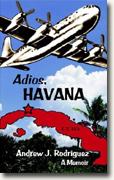

Andrew Rodriguez's memoir of coming of age during the early years of Fidel
Castro's regime is inked in a broad palette of emotional hues - love, fear, frustration, hope, warning and thankfulness. Adios, Havana follows Rodriguez on his life's path as a teenager in 1950s Cuba, on the cusp of the revolution that would spawn Communist control, through the hardship of his young family's refugee years in Miami, to his eventual success as the CEO of his own company in Denver at the heart of his adopted country.
 There is no questioning the love he harbors for his homeland, although he seems to despair of Cuba ever becoming the pure democracy Castro promised his supporters before Batista's fall. In his introduction, Rodriguez says of the countrymen of his beloved, lamented homeland,
There is no questioning the love he harbors for his homeland, although he seems to despair of Cuba ever becoming the pure democracy Castro promised his supporters before Batista's fall. In his introduction, Rodriguez says of the countrymen of his beloved, lamented homeland,
The captivating beauty and delightful climate of their land, the allure of its countryside, and their own naievety seeded unto their society a careless joie de vivre and never-ending sense of humor that eventually weakened their concept of civic responsibility...they didn't do much to extricate themselves from opportunists, demagogues, and chocolate soldiers. They talked, and talked loud, even waving their hands as they talked, but that was all...they were endorsing corruption by neglect; always allowing the inevitable to occur before doing something about it...They realized freedom was costly, fragile, and volatile, but only a few understood the catastrophic effects of its abuse and neglect.
But Rodriguez's story is much more than a frustrated rant at Havana's fall and Castro's longevity and legacy. His story is one of
fierce loyalty to family and a dogged determination to survive the poverty and doubt of life as a refugee.
His youthful anxiety and yearning as he courts his beloved Margarita draws
readers back to the days of their own teenaged insecurities and romantic agonies,
told with the gentle humor that distance in time casts on reminiscence.
The memoir's tone is as often heartfelt as humorous - the sincerity of
Rodriguez's attitude toward the Lutheran community that sponsored him, his young
wife and their infant son in Denver is especially apparent. At other times, when
describing the variety of odd jobs he took and employment opportunities he had
to say "no" to - including gorilla groomer/janitor and mopping up leaking body fluids at a funeral home - the prose turns wry and self-deprecating.
This politically tinged memoir is especially eye-opening to lifelong Americans who only know of the Bay of Pigs as an odd phrase having to do with John F. Kennedy or of Cuba as manufacturing forbidden cigars and being led by a stubborn man in perpetual fatigues. Rodriguez opens up a very personal window into the early years of Castro's rule and tells an uplifting story of great success against difficult odds.


 There is no questioning the love he harbors for his homeland, although he seems to despair of Cuba ever becoming the pure democracy Castro promised his supporters before Batista's fall. In his introduction, Rodriguez says of the countrymen of his beloved, lamented homeland,
There is no questioning the love he harbors for his homeland, although he seems to despair of Cuba ever becoming the pure democracy Castro promised his supporters before Batista's fall. In his introduction, Rodriguez says of the countrymen of his beloved, lamented homeland,